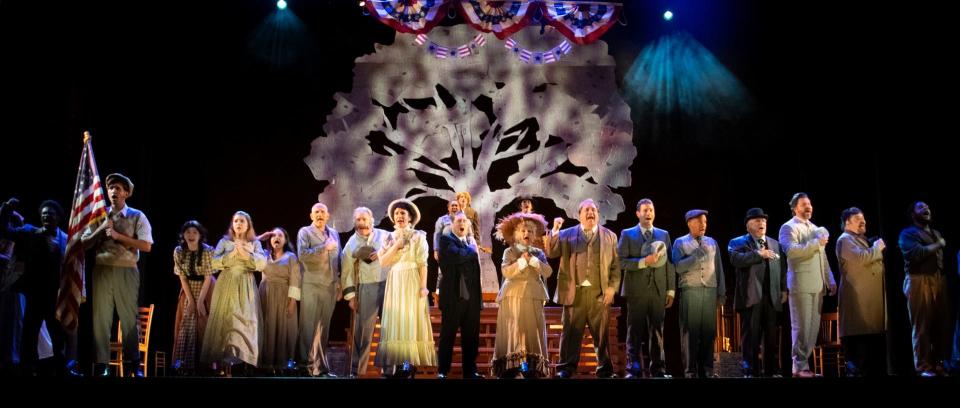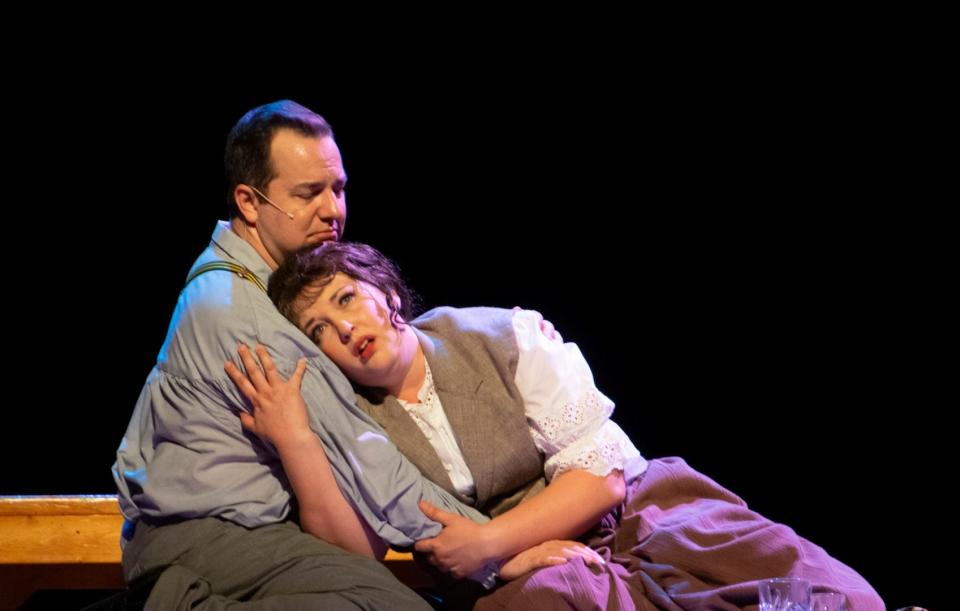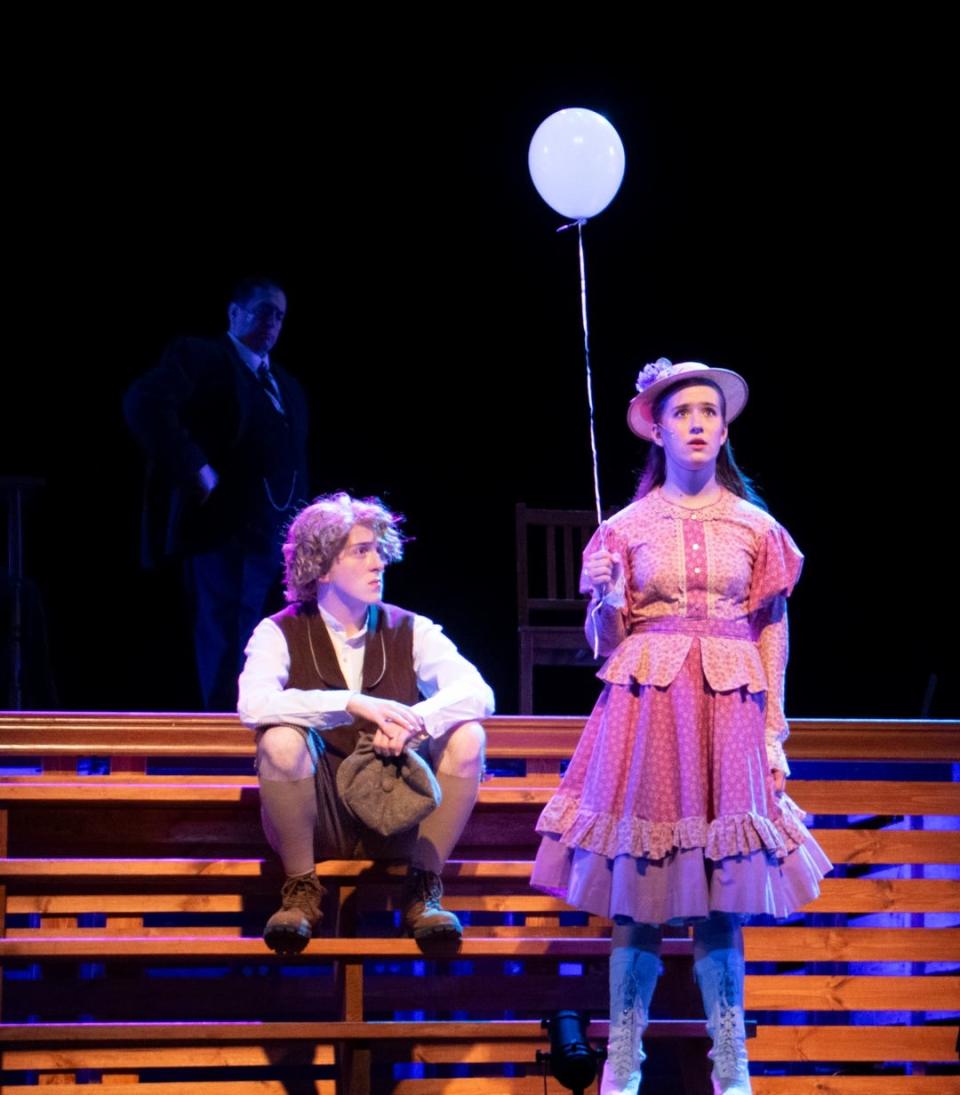Musical ‘Parade’ marches into Manatee Players with power and passion
- Oops!Something went wrong.Please try again later.
- Oops!Something went wrong.Please try again later.
From the opening ripples of a snare drum and the powerful chorus of “The Old Red Hills of Home” to its stirring finale, the Manatee Players production of “Parade” provides the kind of excitement rarely experienced in our area’s community theaters.
It’s a challenging show, both for the cast and the audience, but one that is richly rewarding, particularly in the production directed and choreographed by Scott Keys, who brings clarity and a bit of pomp, bravado and romance to a disturbing story. It is performed by a cast that excels vocally and emotionally throughout the troubling twists and turns.
It is based on the true story of Jewish businessman Leo Frank, the manager of a pencil factory in Atlanta in 1913, who is wrongfully accused of killing a young girl who works for him. The death of Mary Phagan put pressure on the local prosecutor to bring charges and Frank, as both a New Yorker and a Jew, was the kind of outsider or “other” who made an easy target at a time of great racial divisions.

Sadly, as anti-semitism and racial hatred are on the rise, “Parade” is all too timely and even more relevant than when it first opened at New York’s Lincoln Center in 1998.
It is also the story of the blossoming relationship between Leo and his wife, Lucille, a Southern Jewish belle who grew up in a far less traditional religious household. At the start, there is an uneasiness between them – Leo always appears awkward, nervous and out of place, which only makes him more of a suspect to others. But the relationship grows as Lucille finds her bearing to stand up and fight for her husband’s freedom against great odds and the taunts of her neighbors.
The book by Alfred Uhry, the Pulitzer Prize-winning author of “Driving Miss Daisy” and “The Last Night of Ballyhoo,” captures the Confederate spirit of the community and the times and the promise of changing attitudes. But it is the score by Jason Robert Brown that makes the story sing in multiple ways. His music conveys patriotic fervor in the style of the period, as well as a spirit of hope, particularly in the songs performed by Lucille and Leo.
Brown’s music, like Stephen Sondheim’s, seems to inspire the Manatee Players, which staged a sterling production of his “The Bridges of Madison County” in 2017.

Leo and Lucille are played by the real-life husband and wife of Craig Weiskerger and Heather Nicole, who use their clarion voices to make you feel how their connection changes.
Listen to Nicole sing to a reporter, “You Don’t Know This Man” after he has printed lie after lie fed by the prosecutor. She uses the most human ideas to make him see his goodness. When a sign of positive news emerges, together they sing “This is Not Over Yet,” with a buoyancy that sets them to action and temporarily puts aside the trauma. And they share the regret of “All the Wasted Time” as Leo has sat waiting in a prison cell.
There are also strong performances from Elijah Zurek as a young soldier and the teenager Frankie Epps; Mike Nolan as the politically minded prosecutor Hugh Dorsey; Terry Spann as a factory worker who admits to helping move Mary’s body; Seth Bracewell as a Bible-thumping, racist preacher; and Tim Spradlin as Gov. Jack Slaton, who comes to rethink the legal travesty.

Bill Booth has designed a set dominated by a raised wooden platform that becomes many locations, including the base of a giant tree covered in fading newspaper pages. His projections also give us close-up views of real damning headlines during the trial. Caren Brady’s costumes capture the period and the different classes and divisions depicted, and Ethan Vail’s lighting adds to the mood of just about every scene.
The strong cast performs with a rare kind of passion – you can tell this show means something to them – and is accompanied by a small but vibrant orchestra, led by music director Emily Croome. Brown’s score includes some difficult harmonies that the performers, with only a few exceptions, tackle with relative ease.
There are many who look for light-hearted frivolity in the musicals they choose. “Parade” offers something far deeper, more moving and more impactful, and this is a production that should be seen, not just because it’s good for you, but because it’s so good.
‘Parade’
Book by Alfred Uhry, music and lyrics by Jason Robert Brown. Directed by Scott Keys. Reviewed March 7. Through March 17, Manatee Performing Arts Center, 502 Third Ave., West, Bradenton. Tickets are $33-$38. 941-748-5875; manateeperformingartscenter.com
Follow Jay Handelman on Facebook, Instagram and Twitter. Contact him at jay.handelman@heraldtribune.com. And please support local journalism by subscribing to the Herald-Tribune.
This article originally appeared on Sarasota Herald-Tribune: Manatee Players steps up to a powerful production of musical ‘Parade’

